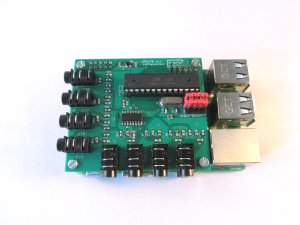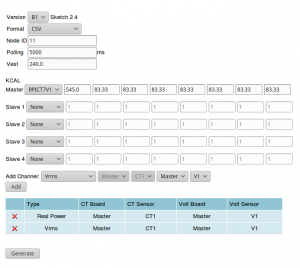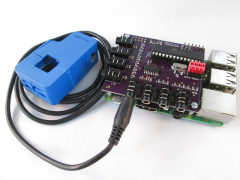RPICT8: Difference between revisions
(→Files) |
|||
| Line 64: | Line 64: | ||
[[File:IMG_1067_small.png]] | [[File:IMG_1067_small.png]] | ||
==Emoncms Config (Emonhub)== | |||
For default configuration. | |||
<nowiki>[[11]]</nowiki> | |||
nodename = RPICT8 | |||
hardware = RPICT8 | |||
[[[rx]]] | |||
names = Power1, Power2, Power3, Power4, Power5, Power6, Power7, Power8 | |||
datacode = 0 | |||
scales = 1,1,1,1,1,1,1,1 | |||
units = W,W,W,W,W,W,W,W | |||
=Python demo script= | =Python demo script= | ||
Revision as of 14:28, 23 February 2018
RPICT8

This page is for board specific information. More information can be found on the generic page for RPICT series.
- 8 AC current sensors.
- Compute real power.
- Fit on Raspberrypi 4 holes mounting pattern.
- AtMega328 Mcu (Arduino UNO)
- MCP3208 ADC
- Stackable (up to 5 boards together)
Recommended sensors
- AC Current sensor: SCT-013-000
Stacking Configuration
General stacking information is described in the RPICT stacking page.
RPICT_Stacking
Software Configuration
Using a serial line terminal program one can configure the following:
- Polling interval - Output format (csv or emoncms) - Calibration values (Voltage and Current) - Voltage/current combinations for real power computation. - Output channels
The documentation for serial configuration can be found on this page.
Over Serial Configuration - Sketch 2.2
Over Serial Configuration - Sketch 2.3
Over Serial Configuration - Sketch 2.4
Over Serial Configuration - Sketch 2.5
 Starting from sketch 2.4 the board can be configured with the online configurator.
Starting from sketch 2.4 the board can be configured with the online configurator.
Files
(note boards are sold already flashed with latest firmware).
Emoncms Config (Emonhub)
For default configuration.
[[11]]
nodename = RPICT8
hardware = RPICT8
[[[rx]]]
names = Power1, Power2, Power3, Power4, Power5, Power6, Power7, Power8
datacode = 0
scales = 1,1,1,1,1,1,1,1
units = W,W,W,W,W,W,W,W
Python demo script
First of all make sure you have python-serial package installed
$ sudo apt-get install python-serial
Then copy the following into an executable file and run it.
#!/usr/bin/python
import serial
ser = serial.Serial('/dev/ttyAMA0', 38400)
try:
while 1:
response = ser.readline()
z = response.split(",")
if len(z)>=7:
print "Power 1: %s Watts" % z[0]
print "Power 2: %s Watts" % z[1]
print "Power 3: %s Watts" % z[2]
print "Power 4: %s Watts" % z[3]
print "Power 5: %s Watts" % z[4]
print "Power 6: %s Watts" % z[5]
print "Power 7: %s Watts" % z[6]
print "Power 8: %s Watts" % z[7][:-2]
except KeyboardInterrupt:
ser.close()
Emonhub configuration
Below is the emonhub configuration for the RPICT8 with output as setup from manufacture.
[hub] ### loglevel must be one of DEBUG, INFO, WARNING, ERROR, and CRITICAL ### see here : http://docs.python.org/2/library/logging.html loglevel = DEBUG #(default:WARNING) [interfacers] [[Serial]] Type = EmonHubSerialInterfacer [[[init_settings]]] com_port = /dev/ttyAMA0 com_baud = 38400 [[[runtimesettings]]] [[emoncms]] Type = EmonHubEmoncmsHTTPInterfacer [[[init_settings]]] [[[runtimesettings]]] url = http://emoncms.org apikey = xxxxxxxxxxxxxxxxxxxxxxxxxxxxxxxx senddata = 1 [nodes] [[11]] nodename = my_RPICT8 firmware = v2.6 hardware = RPICT8 [[[rx]]] names = P1,P2,P3,P4,P5,P6,P7,P8 datacode = 0 scales = 1,1,1,1,1,1,1,1 units =W,W,W,W,W,W,W,W


